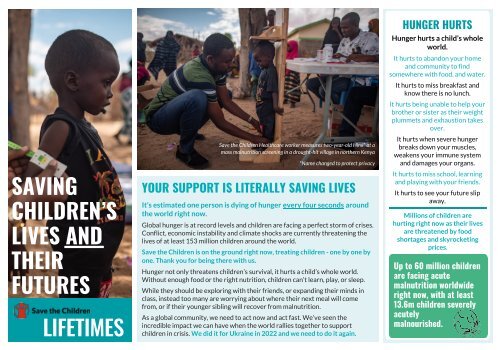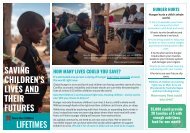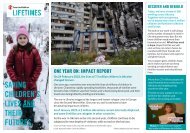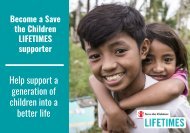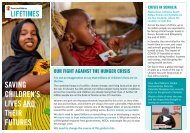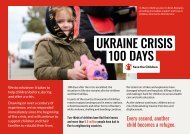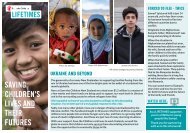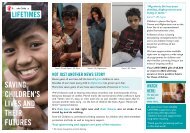LIFETIMES update 6
An update for Save the Children New Zealand's most committed LIFETIMES supporters.
An update for Save the Children New Zealand's most committed LIFETIMES supporters.
You also want an ePaper? Increase the reach of your titles
YUMPU automatically turns print PDFs into web optimized ePapers that Google loves.
SAVING<br />
CHILDREN’S<br />
LIVES AND<br />
THEIR<br />
FUTURES<br />
<strong>LIFETIMES</strong><br />
Save the Children Healthcare worker measures two-year-old Hirsi* at a<br />
mass malnutrition screening in a drought-hit village in northern Kenya<br />
*Name changed to protect privacy<br />
YOUR SUPPORT IS LITERALLY SAVING LIVES<br />
It’s estimated one person is dying of hunger every four seconds around<br />
the world right now.<br />
Global hunger is at record levels and children are facing a perfect storm of crises.<br />
Conflict, economic instability and climate shocks are currently threatening the<br />
lives of at least 153 million children around the world.<br />
Save the Children is on the ground right now, treating children - one by one by<br />
one. Thank you for being there with us.<br />
Hunger not only threatens children’s survival, it hurts a child’s whole world.<br />
Without enough food or the right nutrition, children can’t learn, play, or sleep.<br />
While they should be exploring with their friends, or expanding their minds in<br />
class, instead too many are worrying about where their next meal will come<br />
from, or if their younger sibling will recover from malnutrition.<br />
As a global community, we need to act now and act fast. We’ve seen the<br />
incredible impact we can have when the world rallies together to support<br />
children in crisis. We did it for Ukraine in 2022 and we need to do it again.<br />
HUNGER HURTS<br />
Hunger hurts a child’s whole<br />
world.<br />
It hurts to abandon your home<br />
and community to find<br />
somewhere with food, and water.<br />
It hurts to miss breakfast and<br />
know there is no lunch.<br />
It hurts being unable to help your<br />
brother or sister as their weight<br />
plummets and exhaustion takes<br />
over.<br />
It hurts when severe hunger<br />
breaks down your muscles,<br />
weakens your immune system<br />
and damages your organs.<br />
It hurts to miss school, learning<br />
and playing with your friends.<br />
It hurts to see your future slip<br />
away.<br />
Millions of children are<br />
hurting right now as their lives<br />
are threatened by food<br />
shortages and skyrocketing<br />
prices.<br />
Up to 60 million children<br />
are facing acute<br />
malnutrition worldwide<br />
right now, with at least<br />
13.6m children severely<br />
acutely<br />
malnourished.
WHICH SITUATION WOULD YOU CHOOSE?<br />
Devastating floods or prolonged drought?<br />
Children in the Horn of Africa don't get a choice.<br />
A catastrophic food crisis is unfolding across the<br />
Horn of Africa, with 21 million people facing<br />
critical hunger levels in Kenya, Somalia and<br />
Ethiopia.<br />
Malnutrition levels are at an all-time high with<br />
more than 5.1 million children acutely<br />
malnourished across the three countries.<br />
Extreme weather is destroying communities and<br />
leaving more children without food or a safe place<br />
to live. The region is experiencing almost three<br />
years of drought after five consecutive failed rainy<br />
seasons.<br />
Prolonged droughts in Kenya and now flooding in<br />
Somalia have left communities fleeing their<br />
destroyed homes and without food or water.<br />
With long-term recovery currently out of reach in<br />
Somalia, the prolonged drought followed by recent<br />
floods, coupled with skyrocketing food prices and<br />
an under-funded humanitarian response as a result<br />
of the war in Ukraine, the risk of famine looms<br />
larger than ever.<br />
Your support to Save the Children today is<br />
saving lives tomorrow.<br />
SOMALIA<br />
KENYA<br />
A GENERATION OF CHILDREN AT<br />
RISK IN SOMALIA<br />
Flash floods at the end of May are the latest<br />
in a series of extreme weather events in<br />
Somalia, where children and communities<br />
find themselves at the sharp end of the<br />
global climate crisis.<br />
The floods come after the worst drought in<br />
40 years, following five failed rainy seasons<br />
which has decimated livestock and crops,<br />
pushing the country to the brink of famine.<br />
Around 8.3 million people are currently in<br />
need of humanitarian assistance and almost<br />
2 million children are acutely malnourished.<br />
“We’re coming across families who have<br />
been hit by successive crises ranging from<br />
conflict to drought and now floods and this<br />
is taking a huge toll on them. Children were<br />
already on the brink of starvation as<br />
sequentially failed rains brought about the<br />
worst hunger crisis in 40 years.”<br />
Somalia Country Director,<br />
Mohamud Mohamed Hassan<br />
Save the Children New Zealand has<br />
committed $350,000 to support our<br />
response in Somalia and this is being<br />
matched by the government.<br />
We’ve currently raised $272,347.<br />
70% of people currently<br />
experiencing hunger<br />
worldwide are<br />
women and girls.
WE'RE SAVING LIVES TOGETHER IN SOMALIA<br />
Every day, more children arrive at<br />
Save the Children’s Stabilisation Centre<br />
in drought-ravaged Baidoa.<br />
They’re carried from remote farms and villages<br />
by parents desperately seeking food and help.<br />
But the centre is full, and makeshift wards<br />
have had to be set up in tents outside.<br />
ETHIOPIA<br />
BAIDOA<br />
SOMALIA<br />
How we're supporting children<br />
Providing treatment for malnourished<br />
children<br />
Supplying emergency food assistance<br />
to families<br />
Giving cash transfers to families to buy<br />
essential supplies<br />
Assisting communities to access clean<br />
water<br />
Casho* travelled on foot for two days and two<br />
nights with her children from their rural farm in<br />
Baidoa in search of food, water, and medical<br />
treatment.<br />
Casho’s family recently lost their livestock due to<br />
drought and her children are malnourished. Her<br />
two-year-old daughter Fawzia* is receiving<br />
treatment for malnutrition at Save the Children's<br />
health clinic on the outskirts of Baidoa.<br />
Your support is literally<br />
saving lives.<br />
Thank you for<br />
partnering with us.<br />
AUSTRALIA<br />
NEW<br />
ZEALAND<br />
SHE’S SMILING AGAIN<br />
Marwa might be<br />
smiling now, but one<br />
month before this<br />
photo was taken it was<br />
a different story for<br />
this 15-month-old girl.<br />
Marwa had been<br />
unable to eat anything<br />
and she was suffering<br />
from a fever, coughing,<br />
vomiting and<br />
diarrhoea.<br />
Her mother, Hodan, heard about Save the Children’s<br />
mobile health centre from others in her village and<br />
managed to get a lift to the location - 15km away.<br />
Marwa was checked and given treatment, before<br />
they returned home - with a one month supply of<br />
therapeutic food. When Marwa and her mother<br />
returned for a follow up visit, she was in much better<br />
health.<br />
Hodan and her husband were pastoralists but lost<br />
most of their livestock due to drought, meaning food<br />
was in short supply which left Marwa struggling to<br />
survive.<br />
Thanks to<br />
supporters like<br />
you, Save the<br />
Children’s mobile<br />
health clinics are<br />
set up for a month<br />
in a location the<br />
majority of the<br />
surrounding<br />
villages will be<br />
able to access.
GROWING FOOD AND RESILIENCE IN SOLOMON ISLANDS<br />
Across the Pacific, the impacts of climate change<br />
are directly affecting many communities and<br />
contributing to hunger in places like the Solomon<br />
Islands.<br />
It’s one of the most vulnerable countries in the<br />
world to climate change and disasters. As well as<br />
this, many communities are still struggling from<br />
the impact of COVID-19 with almost all Solomon<br />
Island families having experienced a decline in<br />
income.<br />
Many families are dependent on agriculture for<br />
household income, but climate change and<br />
repeated use of the same land has led to problems<br />
with soil fertility and pests and diseases. They are<br />
also experiencing sea level rise and increasing<br />
droughts and heavy rains.<br />
Save the Children has been working with 15<br />
communities in the Solomon Islands to improve<br />
food security by boosting food productivity.<br />
Working in partnership with the Ministry of<br />
Agriculture and Livestock, the project is helping<br />
to deliver training sessions, establish community<br />
nursery banks, establish water management<br />
systems, distribute tools and seedlings and<br />
provide support to local communities to access<br />
markets to sell excess produce.<br />
Organic farming methods demonstrated to community members.<br />
Jemma, 17, lives in a coastal community in the Solomon Islands<br />
with her parents and three sisters. Their home is on stilts and is<br />
slowly going underwater.<br />
As a child, Jemma used to play with her siblings happily and safely on<br />
dry ground, however water now surrounds her whole home.<br />
Tragically, Jemma has lost two of her siblings to the crisis slowly<br />
inundating her family’s village. In 2014 her 10-year-old brother was<br />
sitting on a nearby sea wall when he was pulled in by a high tide and<br />
drowned. And in 2017, her 6-year-old sister Dona, who had a disability,<br />
was swept into the ocean when she was crawling along a path near the<br />
house and passed away. These events have devastated Jemma’s family.<br />
The rise in sea level has also ruined her family’s nearby garden. Nothing<br />
grows now that the soil has been inundated with salt water brought in<br />
by the tides. Instead of supplementing their meals with homegrown<br />
fruit and vegetables, Jemma and her siblings eat predominantly rice,<br />
tinned food and noodles.<br />
“The sea level rise destroys our food gardens making it very difficult<br />
for us because we have very little farmland, and we can’t go anywhere<br />
else. I kindly ask the good people from other countries to help those<br />
who have been suffering from climate change and sea level rise.”<br />
Our food security project in the Solomon Islands is helping Jemma’s<br />
family adapt to the effects of climate change and rising sea levels and<br />
ensuring they have nutritious food to eat all year round.<br />
YOUR SUPPORT<br />
MAKES A DIFFERENCE<br />
Whether they live in Somalia or<br />
the Solomon Islands, children<br />
shouldn’t have to go hungry -<br />
there's enough food in the world<br />
for everyone.<br />
We're deeply grateful for your<br />
continued support to Save the<br />
Children which is helping improve<br />
life for many children around the<br />
world - and in many instances,<br />
literally saving children's lives.<br />
Jemma and her family at home.<br />
We know times are tough for<br />
many people right now, but if<br />
you're in a position to help ensure<br />
we can continue treating children<br />
suffering from malnutrition then<br />
I'd love to hear from you.<br />
mandy.carian@scnz.org.nz<br />
ph: 04 381 7572<br />
Thank you for your<br />
wonderfully generous support<br />
which is helping children to<br />
not only survive, but to move<br />
forward into a more positive<br />
future.


